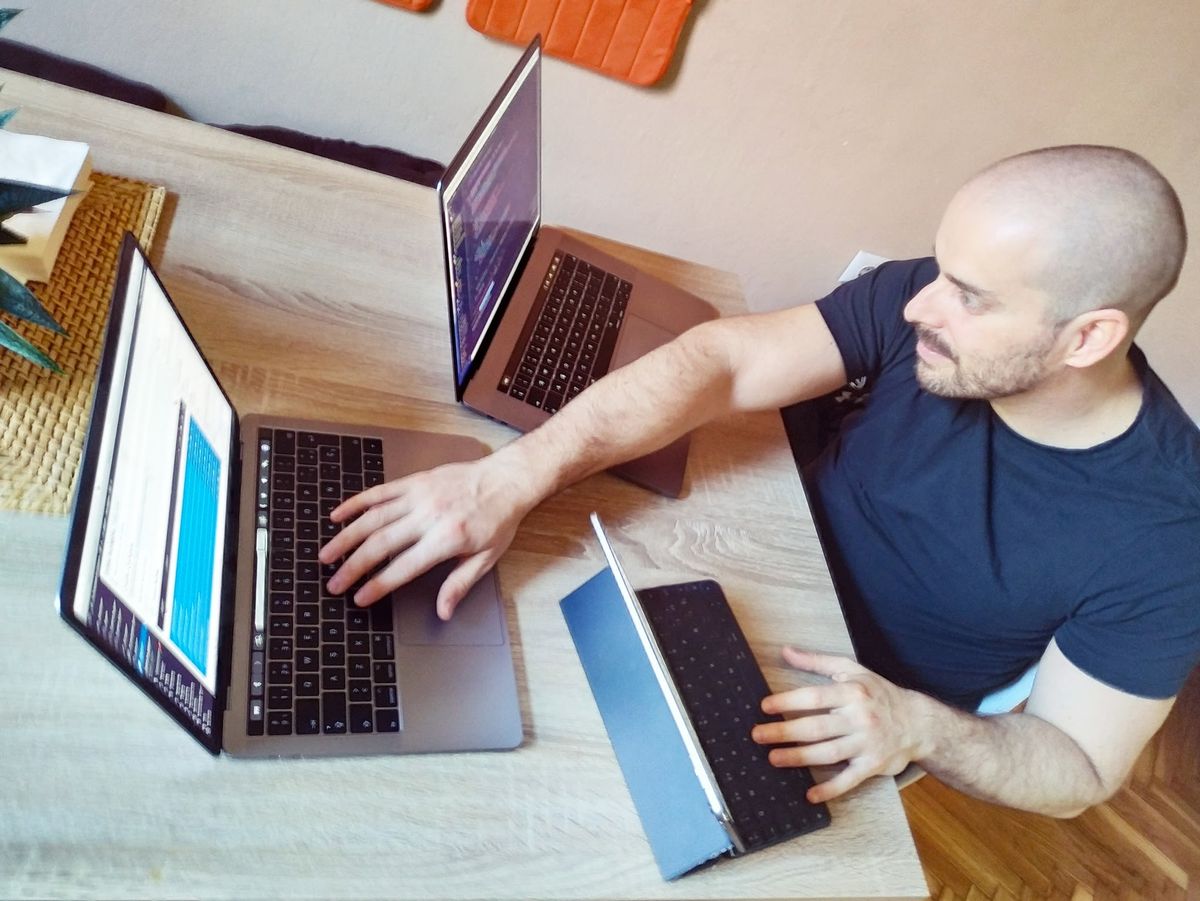This is why your business needs to adapt, and fast, to the coronavirus pandemic

Everything is going to change after the coronavirus pandemic… Your business should too. And fast. The world we live in, our societies, our economies, ourselves… Nothing is going to be the same.
Besides the terrible toll of lives and the psychological damage of confinement and losing friends and family member, there is an economic crisis already hitting the whole world. It’s been deemed worse than the great depression, especially in terms of job destruction and business disruption.
In this article, I share my thoughts on why your business needs to change, and fast, on the wave of the coronavirus pandemic, and share some ideas and real example of businesses that have done that already.
The COVID-19 has changed everything
No matter how sick they say they are about the news of the pandemic (no pun intended): when people wake up, the first thing they do in the morning is googling “coronavirus”. That is also the last thing they do before going to sleep. It is a fact. The coronavirus pandemic has monopolized the content of search engines, social media platforms and blog posts worldwide.
People are anxious. Shops are closed, restaurants, bars, even non essential businesses in some countries are closed, there is a lot of uncertainty about the future. Nobody knows when –or even if– we will be able to go outside again and recover our normal lives. Wuhan, the epicenter of the pandemic, just reopened after a two-month lockdown. Nobody knows what’s gonna happen, and everybody is scared of the possibility of a second outbreak or even recurring waves if a vaccine or effective treatment is not found soon.
This is not the best scenario for business. The situation, according to the experts, is very close to a war economy. So what can you do?

Adapt your business if you want to survive
If your business is physical, like a restaurant, a gym, or a yoga studio. You are fucked up. It does not matter where you live. No governmental support, no European rescue fund, no last minute subsidy is going to completely protect your business from going bankrupt.
This is a reality many companies are facing already. Even if you have a digital presence, if your business relies on social contact, facilities, an office, or interaction with your customers, you are probably going through difficulties these days.
It is imperative that you react and adapt your business to the new reality. Today, not tomorrow. While the current scenario is bleak, there are options. These are just some ideas that some companies and entrepreneurs I know are doing. It’s worth considering them.
Morph your business
Angel Baby is a company from Sofia, Bulgaria, specialized in baby bags, famous for its social responsibility campaigns. When the coronavirus crisis arrived, they changed their production model and started sewing face masks, temporarily first, and then more regularly.
This happened almost by chance: some friends of the founders asked them to sew some face masks. But it is a prime example of how you can morph your company to adapt to the demands of a completely new reality.
Probably not every business can find a this new market fit that easily, but it is worth asking yourself: what can my company do now that is similar to what we were already doing?
Go digital
My partner has an eco-respectful web design agency: Ecoweb Solutions. One of his customers is a company that organizes team building events for companies and organizations using percussion and grupal drum playing in Spain.
Needless to say, as soon as Spain finally approved the confinement of the population, they lost all their customers. Their business was gone. No foreseeable events in months to come. Few businesses can survive that scenario.
Fortunately, they reacted quickly. They have started to record and edit online percussion courses and they plan on releasing them immediately. By going digital, they have found a new market that may allow them to survive. Now that half of the world’s population is confined inside their homes, the consumption of digital products and online content consumption has skyrocketed. Even giants such as Netflix, Youtube and Amazon have been forced to reduce the quality of their streams to cope with the increasing demand.
Think on ways of digitalizing the expertise and knowledge of your company into digital products or services that you can offer, either standalone or as an addition to your current services.
Embrace remote work
In 2020, most companies and organizations can perform a large percentage of their activity online. Except for purely physical businesses, and even partially for them, embracing remote work has become a necessity these days.
There is obviously a cultural resistance, especially in certain societies, against remote work. The stereotypic boss from Spain wants to see their employees already working when he arrives to the office, and wants to see them on their seats when he leaves. They confuse time at work with productivity.
Things are changing, fortunately, but still not at the right pace. I am sure this crisis will definitely change the job ecosystem. Lots of companies will realize the world does not end if they allow their employees to work from home.
If your business is paralyzed because your employees must stay home, consider how you could implement remote work. If not 100%, at least enough to keep your business alive. Get over your biases and preconceptions. Embrace remote work. It may not only save your business, but cut costs and make your employees happier.
Even if your business is digital…
Even if your business is digital, you should adapt to the new reality of the market. The business ecosystem is an interconnected, fragile beast. And the beast is wounded and scared right now. You must understand that we are facing an unprecedented scenario.
So even if you think you are in a good position to endure it, I recommend you to follow some basic rules to protect your business.
Be considerate, respectful and sensible
The coronavirus has killed more than 60,000 people as of today, and forecasts show that the death toll will, unfortunately, increase dramatically in the incoming weeks. Half of the world’s population is confined at home. You need to assume that, one way or another, your customers have been hit by the pandemic.
You need to be extra careful with the official statements and communications of your company. Be respectful, considerate, and sensible, and re-check your copy to make sure it makes sense in the current situation.
As an example, Companio offers services that are specially tailored to digital nomads. In the current scenario, traveling is not an option for millions of people, and some nomads are trapped in the country they were visiting, like myself. Some of them may be hospitalized in a foreign hospital of a foreign country, maybe surrounded by nurses who can’t speak proper english. I went through that experience and it was not funny.

Be helpful
Ask yourself this question. How can my business help my customers during this difficult period?
Ok, helping your customers one by one yourself, or even with the help of your team, may not be realistic. But there is a lot you can do. Depending on your resources and flexibility, that can go from small details like opening additional communication channels to grand gestures such as postponing or even writing off debts or payments for your services.
As an example AirBnB, exceptionally, allowed guests to cancel reservations for this critical period with full refunds, including their fees. While you may not be able to get to that level, there is always something you can do. Even the smaller gestures will be appreciated these days.
Change your marketing strategy
You need to be aware of two important facts:
- First, your current customers have changed. You cannot consider them the same people they were a few months ago.
- Second, your leads, your future customers, are completely different from the ones you knew previously. Their interests, lifestyle and concerns are completely different now.
With that in mind, you should change your marketing strategy. Rethink your target persona and account for their needs and worries. As an example, in Companio, we cannot keep on talking to digital nomads like we did in the past. We need to acknowledge the fact that they are going to be stuck in a country, or back in their home countries, for some time. We don’t even know if traveling, flights, airplanes, borders… will be the same in the future.
Get your eggs out of that basket
You may have already found that the awkward way, but you should diversify your markets and broaden your lead base. Look for new opportunities. Do some research and find out what is working now, what businesses are thriving while others are sinking (food delivery platforms, dropshipping, medical and sanitary products…).
It was generally accepted that focusing on a single product, and targeting a very specific niche market, was the right strategy these days. I also believed in that. But the world has changed. That is not true anymore. We are only started to understand the new dynamics that will emerge in our societies, and that will obviously reflect in our businesses.
So be ready to react fast, and look for different markets you can serve with a variation of your current product. Adapt your strategies to these new markets.
Plan for the rainy day
The digital businesses are at the end of the chain. If you have a web design studio, or an online marketing agency, you can continue working. Most probably you are already working remotely, as internet is your place of work. That’s the case of my business, Companio. We offer our services 100% online, and the team, 15 people, work from home. Our customers are digital businesses too, meaning, they are in the same situation. They can still do business, supposedly, as they are digital and don’t rely on a specific location or physical product.
That means we are going to suffer the effects of this crisis last, but make no mistake, we are going to suffer them. If one of your customers has to close her pilates studio due to the crisis, she will stop paying you for the website and marketing campaigns you used to do for them.
And that is already happening.
So just like some countries were able to learn the lessons from China and Italy like Czech Republic or Bulgaria while others such as Spain ignored them, prepare a damage control strategy today. Have your plan B in place. Look for new markets, new opportunities, focus on what brings you revenue and cutting costs… Take advantage of this window of opportunity.
Conclusion
The world has changed. The impact of the coronavirus pandemic on the economy and the business system is yet unknown, but we know it’s going to be severe, and probably long-lasting. If you want your company to survive, you need to adapt your business, and fast, to this new bleak scenario we are living.
There is unfortunately no bulletproof tactic you can implement to protect your business. We have difficult times ahead of us, and lots of companies are not going to make it. Still, we have to do our best to put our businesses in the best possible position.
In this article, I shared my thoughts on possible strategies and considerations that you, as a business owner, can do today to minimize the effects of the incoming crisis and help you survive, or even thrive, during this difficult period.




Comments ()